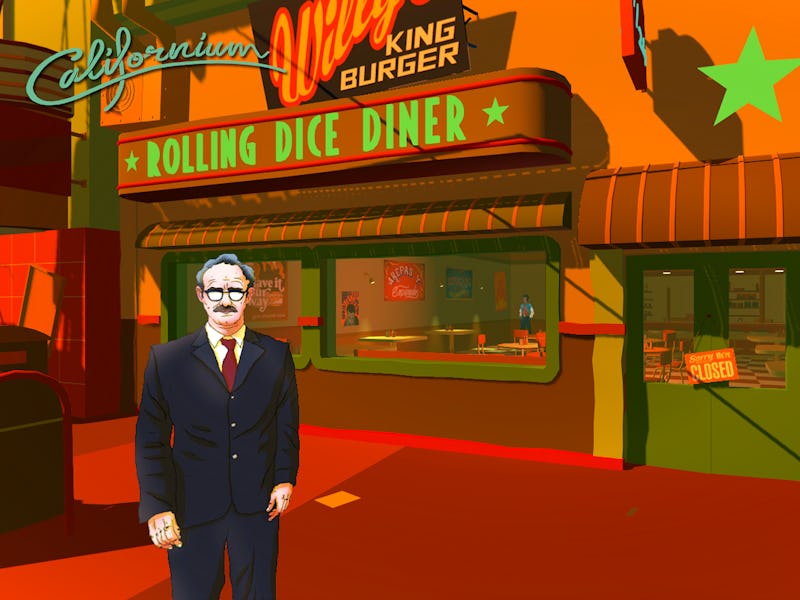Californium' Ends a Streak of Lame Philip K. Dick Games
Now that 'Californium' has delivered, will larger studios roll the dice on Philip K. Dick-inspired console games?

Over the past year, Philip K. Dick has hit what might be described as a mini-cultural resurgence. For the first time, PKD stories have been adapted for the small screen, and while Minority Report was unceremoniously dumped, Man in the High Castle set Amazon streaming records and will return for a second season.
Yet, for as hit-and-miss as PKD adaptations have been on-screen, Philip K. Dick-inspired video games have had a long and horribly underwhelming history. Since Ridley Scott’s Blade Runner debuted (the book was originally titled Do Androids Dream of Electric Sheep?), there have been a grand total of 4 video games based on the work of Philip K. Dick. And to put it in the most generous of terms, all 4 were complete and utter shit.
In the 1985, British developers CRL Group created Blade Runner, a side-scroller for the Commodore 64. But the company designed the game without acquiring licensing rights, so the original Blade Runner PC game was published as a “video game interpretation of the film score by Vangelis.” A second Blade Runner game, this time a point and click adventure for PC, was published by Westwood Studios in 1997. With a proper licensing agreement acquired this time, Westwood wrote their Blade Runner as a side-story firmly within the universe of Ridley Scott’s 1982 film. However, even with a decade’s worth of advancements in gaming technology and a cast that featured many of the original actors from the film, Westwood’s Blade Runner fell flat. While it got the visual atmosphere right, the plot was uninspired, the controls were cumbersome, and the game was glitchy as hell. It was certainly superior to the CRL Group’s 1985 iteration, but ultimately, Westwood’s Blade Runner was just as forgettable.
The next entry in the “Philip K. Dick playable universe” was Total Recall, released for the PC and the NES. The PC version of this game wasn’t actually terrible, but it only sold a grand total of 8 copies. The more oft-played Nintendo game of the same name was a mockery even by early 90’s 8-bit standards, and that disappointment had a lot to do with there being only one more attempt at a console adaption of a PKD story for the next 3 decades. That last attempt at PKD inspired video game was the 1998 Ubik by Cryo Interactive. Ubik actually wasn’t too bad conceptually, but it was a bit too overambitious for the technology. On the PlayStation One, it wasn’t uncommon to wait 30-40 seconds for a screen to load, which was more than enough time to eject the disc and load in any Final Fantasy game.
Most Philip K. Dick fans had long since given up hope of an even remotely playable video game until Arte Creative, a French multimedia studio, published the PKD-inspired Californium with surprisingly little fanfare.
Californium is a fairly short, first-person exploration game that puts you in the role of Elvin Green, a writer-turned-addict and failed family man. The game — which is probably best described as interactive narrative — is half acid trip, half nervous breakdown. In terms of gameplay, the goal is basically to help poor Elvin navigating his altered universe (more appropriately, a series of altered universes) by engaging in surreal conversations with other characters and inanimate objects alike, and ultimately finding pathways from one reality to the next.
If that plotline seems vaguely familiar, but you can’t quite place it in any particular PKD novel, it’s because Californium is more about Philip K. Dick’s own life than any particular story. Of course the beauty of that is it kind of makes the game somewhat reminiscent of just about all of the sci-fi pioneer’s tales. In fairness, while Californium is fantastic if you’re a Philip K. Dick fan, it might leave something to be desired if you’re not familiar with the author’s life story.
Regardless, the fact is after almost 4 decades, someone finally made a Philip K. Dick-inspired game, and it didn’t completely suck. Of course, the question is now that Californium has shown a decent Philip K. Dick game can be made, will we see any of the larger game studios start optioning some of PKD’s more well known works for a console game?
Most Philip K. Dick fans would be ecstatic if a major game studio rolled the dice on a PKD console game, but the problem is that the same qualities that make Philip K. Dick novels so great to read are what make them hard to capture on film — and doubly hard to capture as a video game. Even the more action oriented PKD adaptations like Blade Runner or A Skanner Darkly that work on the big screen are still so introspective in nature, capturing the essence of the stories while holding the attention of players is a daunting task in a video game format.
That said, there are some console games that are able to retain PKD-like cerebral narrative qualities, and while they tend to be critically acclaimed, they often fail to deliver the kind of return on investment the larger studios need to cover their costs. Heavy Rain came out of nowhere to make Sony almost $100 Million, while the highly anticipated L.A. Noire lost millions of dollars, and eventually put its developers, Team Bondi, out of business.
The key to a legit Philip K. Dick console game might rest with the success of *Quantum Break*
The likelihood of a big-budget, PKD-inspired game will depend on the success of eighth-gen interactive narrative games like Quantum Break. If a game like Remedy Entertainment’s genre-bender are received well critically and can still turn a profit, studios might be more willing to dedicate resources to bring a proper PKD adaptation to the console.